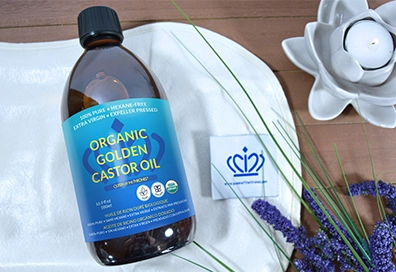
Castor Oil: Everything you need to know about its history, uses, and benefits
Written by: Joanna Teljeur M.A.
Medically reviewed by: Victoria Williams R.H.N.
Est. reading time: 7 minutes
Are you seeing Castor Oil products everywhere and wondering if it’s just another fad?
It seems like everyone has jumped on the Castor Oil bandwagon, right? But you’re there scratching your head trying to figure out if you should take it seriously.
While there seem to be some benefits, they contrast with your memory and notion of what Castor Oil is all about. You may have been a lucky one where your mother or grandmother would give you Castor Oil weekly to clean out your gut! Is this you? Well, you’re not the only one confused about the merit of this golden oil.
Castor Oil seems to live in many people’s memories as something pretty unpleasant. Even its name, Ricinus communis, has a strange vibe. The name is Latin for tick and was chosen because Castor beans look like ticks engorged with blood. Not exactly an inviting image, is it?
And it goes on! The Castor Oil plant is widely known for being extremely poisonous. In fact, eating as few as 2 raw Castor Beans can be fatal, and the protein, ricin, that’s found in the beans has been used as a biological weapon!
So, what’s going on here?
Have you ever wondered how something so potentially dangerous could be in use for over 4000 years by countless people from dozens of countries? Why has it been touted for centuries as a magical, golden elixir that can provide benefits from healthier hair to better sleep and digestion? And why has it had such a monumental resurgence – hailed across social media as a kind of ‘cure-all’?
Well, in this blog, we’re going to find out the backstory of Castor Oil, what it does and doesn’t do, and how this common plant grew to become an historic wellness icon.
The History of Castor Oil
Fast forward a few thousand years and the Egyptians, who were aware of the Castor Bean’s toxicity, were using Castor Oil for pharmacological purposes as an abortifacient, a laxative, and a remedy for baldness2. Apparently, even Queen Cleopatra used Castor Oil on her skin, hair, and eyes to enhance her natural beauty.
In Greece, around 400 BCE, Hippocrates was using Castor Oil as a laxative3, and in Ayurveda, it is used even today as a remedy for bronchitis, fever, cough, skin diseases, constipation, inflammation, and colic1.
And in Unani Medicine (Arabic traditional medicine), Castor Oil was used orally as a purgative and topically for boils, lumbago, ringworm, asthma, and amenorrhea1, while on the Mediterranean coasts of Europe, Castor leaves and Castor leaf juice was used on the breasts of postpartum women to encourage lactation.
So, the Castor Oil Plant seems to have begun its journey as a weapon, but it makes you wonder how it evolved into the therapeutic realm that it inhabits today, agreed?
Well, remember how the Castor Oil Plant’s Latin name means tick because the seeds or beans resemble a blood-filled tick? Maybe this was a sign to the ancients? You see, according to the Doctrine of Signatures, the appearance of an object can give you clues to its helpful or harmful potential. Perhaps the ancient people thought that the beans of the Castor Oil Plant could suck the life out of their enemies? Who knows – but the fact remains that they definitely saw something powerful in the plant.
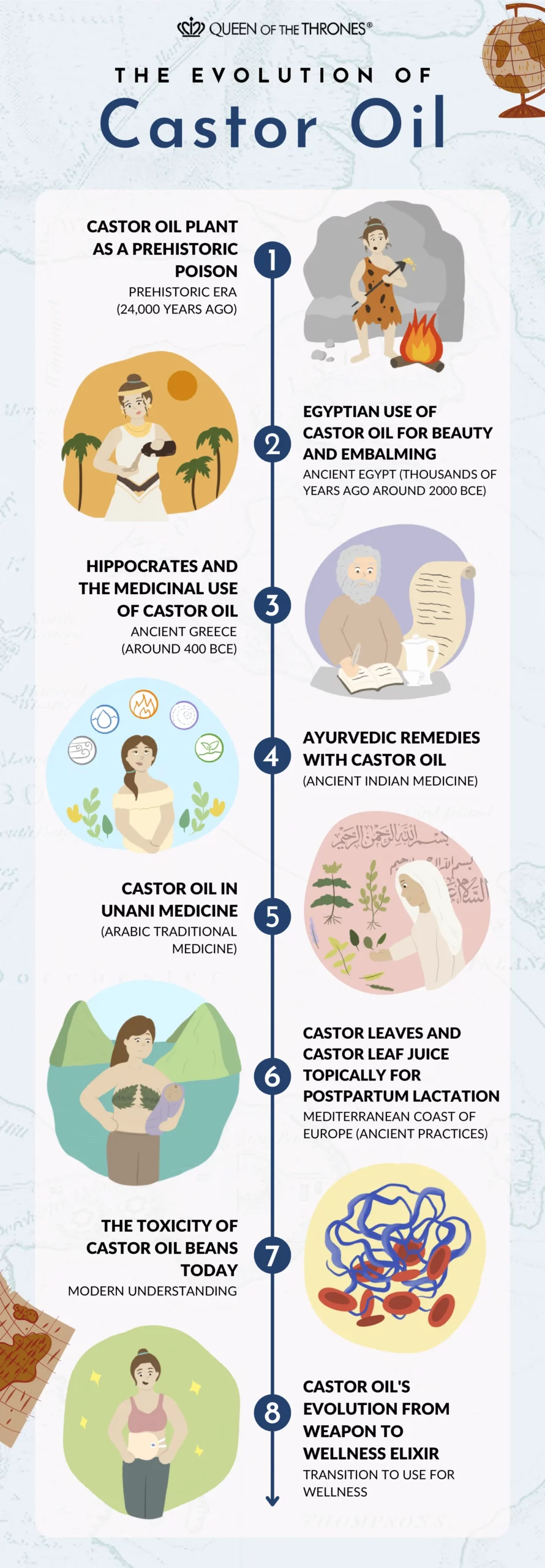
Today, Castor Oil is everywhere as a wellness elixir, but the Castor Oil Bean is still poisonous because of the lectin protein, ricin. It’s toxic to humans because it can attach to the cell membrane of human red blood cells4.
Now, you’re probably wondering if you’ll have any ill effects from using Castor Oil? Fair enough, but the good news is that during the extraction process, Castor Oil becomes ricin-free which means it is completely non-toxic5. Whew!
Castor Oil in the Modern World
The use of the Castor Oil Plant as a medicinal remedy continued to gain a lot of traction. Over the centuries, it’s been called Palma Christi which means the Palm of Christ, and Kiki by the Greeks which means bringing good luck.
It even had a leading role in the Biblical story of Jonah who sat under a towering Castor Oil Plant for shade. The plant must have held some huge cultural significance for it to remain in the story for over 2000 years.
But over time, Castor Oil’s uses started to expand. By the late 1800s, it played an important role in manufacturing as an effective lubricant, and scientists were revisiting the plant for its toxic elements that could be harnessed and used as chemical warfare. Since then ricin has had nefarious uses as a biological weapon.
Then, in the early 1900s, Edgar Cayce introduced Castor Oil as a healing elixir in North America. He popularized the Castor Oil Pack and was celebrated as a skilled “bedside healer,” incorporating these oil-soaked packs as a central part of his therapeutic treatments, regardless of the specific health condition or ailment. This approach attracted significant attention and gained recognition within the natural health community.
In the 1960s, with the growing popularity of health food stores across North America, Castor Oil became a fundamental and easy-to-find natural remedy. Today, you can find Castor Oil everywhere online and in health food stores reflecting its enduring popularity and widespread use by naturalists, naturopathic doctors, herbalists, and other proponents of alternative wellness practices.
Why is Castor Oil so special?
Castor Oil has “…been confirmed as a bactericidal, anti-inflammatory, and antiherpetic agent, due to the ricinoleic acid.”6
Unlike other well known oils, Castor Oil is the only one that contains ricinoleic acid, and this is what makes it so special. Basically, ricinoleic acid is an unsaturated fatty acid with a hydroxyl end on the twelfth carbon, also known as a fatty hydroxyacid. I know – welcome to chemistry class! All you need to know is that this gives Castor Oil super-useful properties like being soluble in alcohol, and this allows it to have so much versatility in many different industries7.
How is Castor Oil extracted?
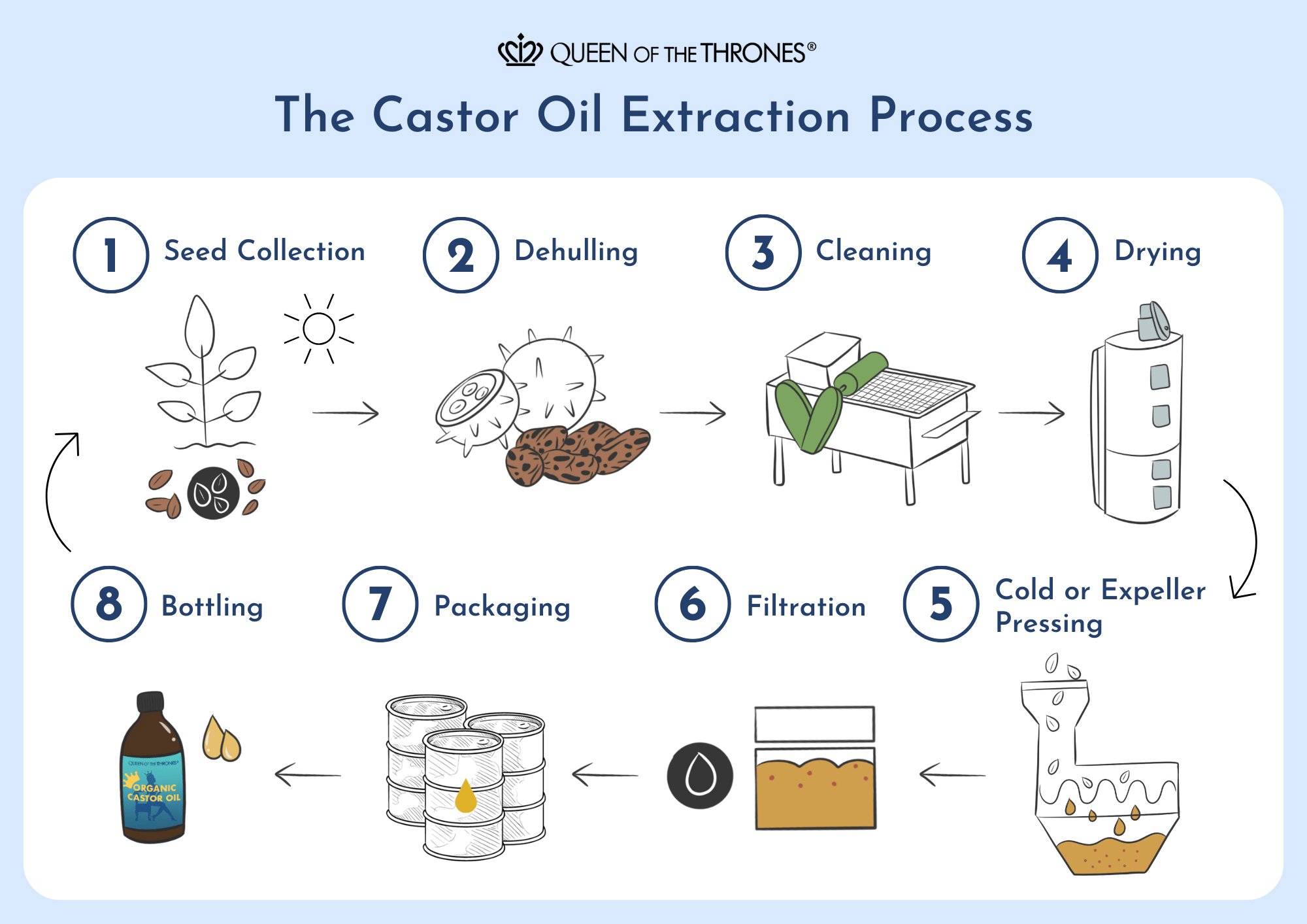
The journey from Castor Bean to the highly sought-after Castor Oil is an interesting process. The composition and quality of the oil are highly affected by the mode of extraction: Expeller-pressed, cold-pressed, chemical extraction, and Jamaican method which gives you Black Castor Oil.
Expeller Pressing
Expeller pressing, also known as the “screw press” method, is a method that uses a machine that exerts intense friction and pressure to extract the oil. Unlike some other extraction processes, expeller pressing doesn’t involve the addition of heat.
However, due to the friction generated during the pressing, heat naturally forms in the range of approximately 140-210°F. Once the seeds undergo this pressurized process, the oil is separated.
Cold Pressing
In contrast to expeller pressing, cold-pressed Castor Oil extraction involves minimal heat. This process starts with placing Castor seeds in a press, followed by crushing to extract the oil. Notably, during the pressing process, the temperature remains lower, usually around 122°F. This method produces lower yields.
Chemical Extraction
Processed this way, the Castor Beans are crushed, then a chemical solvent (usually hexane) is used to help extract the oil. While this may be more cost effective, adding hexane can compromise the quality of the oil. This is why high-quality, organic Castor Oil will always be hexane-free.
Jamaican Method
With this method, the beans are roasted and then crushed. After that, water is added and the mixture is slow-boiled. Unlike the other extraction methods, this process creates a thick, blackish brown oil that is more alkaline than golden Castor Oil.
What is Castor Oil used for today?
Well today, as you’ve surely noticed, Castor Oil’s legacy continues to evolve. Organic Castor Oil has found a solid home in several flourishing industries including:
- The skincare and cosmetics industry
- The haircare industry
- The holistic wellness and self-care industry
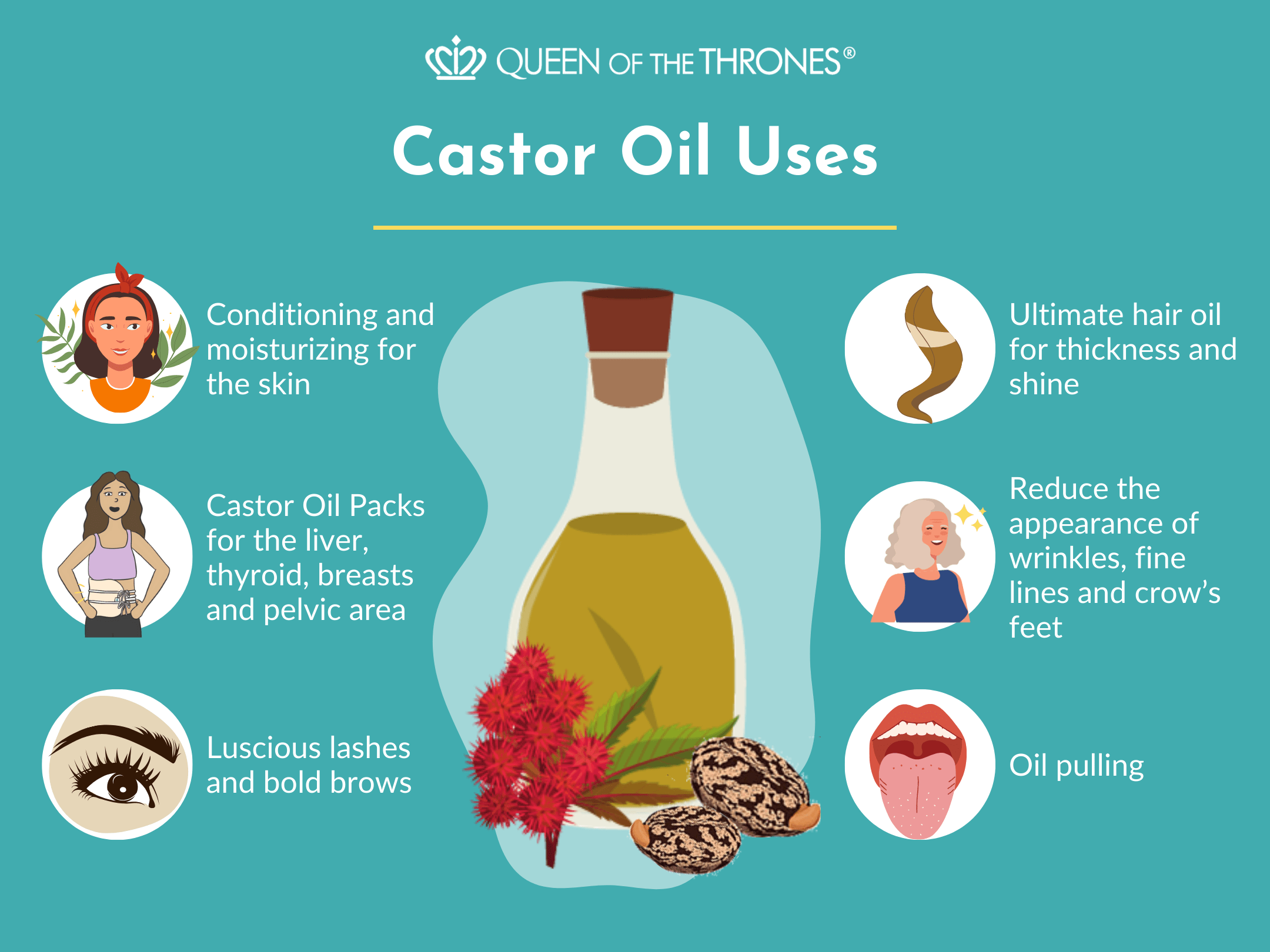
Castor Oil for Skin
The way Castor Oil works its magic on your skin is thought to be linked to its chemical makeup. This rich, light golden oil is loaded with polyphenols, essential fats, and other nutrients that work especially well for supporting the appearance of more vibrant and youthful looking skin.
It’s non-comedogenic, meaning it can be used to support pimples, rashes, eczema and other skin problems.
And as you can imagine, it’s gained wild popularity as a way to plump up your delicate skin, especially around your eyes, where it is used to help reduce the appearance of fine lines and wrinkles. Not only that, but when you smooth it onto your eye area, Castor Oil may help support longer, thicker lashes and fuller brows!
Castor Oil for Hair
Cherished for its skin moisturizing properties, Castor Oil has gained tons of popularity for the notion that it may support hair growth and enhance hair thickness which is why you see it in so many hair care products.
Depending on your unique hair and skin type, darker skin and thicker, curlier hair may benefit more from Black Castor Oil, while lighter skin and thinner hair may do better with Golden Castor Oil.
Thanks to its hair-loving nutrients like like polyphenols, omega fatty acids, and Vitamin E, Castor Oil may help support:
- Signs of aging hair
- Shine and luster
- Thickness
- Texture
- Dry and/or itchy scalp
- Color treated or heat-damaged hair
Castor Oil for Eyes
Castor Oil for eyes has become a hot topic with a fair amount of controversy surrounding it. But here’s what we know at the moment: Research on the ocular application of Castor Oil appears that it may help to alleviate dry eyes8.
In instances of conjunctivitis, where redness of the eye is a prominent symptom, a solution containing 2% cyclosporine is safely used9. In this type of scenario, it seems unlikely that Castor Oil functions merely as a carrier oil. Instead, it may contribute to the therapeutic effect because of its anti-inflammatory properties10 and promotion of nitric oxide production11.
Castor Oil is actually a common ingredient in eye solutions that work as artificial tears because of its ability to help support lubrication and also keep moisture in the eye.
Historically, Castor Oil has been used in Southern India as a remedy for maintaining ocular health and enhancing the beauty of the eyes and cornea12, and other cultures have developed their own unique traditions with similar applications of Castor Oil for various purposes13.
Castor Oil has gained a lot of popularity as a way to grow thicker eyelashes and fuller eyebrows. The big questions seem to be: Is it safe, and does it work?
Well, the nutrient make-up that helps support hair on your scalp may also support brows and lashes. As for safety: You should always exercise caution with anything around your eyes and only use high quality organic oil. For use IN the eyes, only specialized sterile Castor Oil is safe.
Castor Oil for Self-Care Practices
When it comes to holistic self-care and wellness practices, Castor Oil Packs have made a massive come back! Homemade Castor Oil Packs were always a popular choice to support bloating, constipation, and digestion, but more recently, less-mess packs like Queen of the Thrones® Castor Oil Packs have shown that their wellness uses are even more far-reaching than anyone could have imagined.
Queen of the Thrones® has taken the traditional DIY pack and made it an easy and convenient choice for your liver, pelvic area, thyroid, and even your breasts.
And beyond personal care, Castor Oil’s versatility even extends to industries such as pharmaceuticals, food additives, and renewable energy sources. Interestingly, Castor Oil biodiesel has potential as an environmentally friendly alternative to traditional fossil fuels. Strange to think that one substance can have so many diverse uses!
Castor Oil for Constipation
But when you use Castor Oil with a pack on your abdomen, you may get a similar bowel movement action, without the harsh urgency that comes with ingesting Castor Oil.
A study in nursing home residents, for example, found that Castor Oil Packs worked as well as laxatives in helping support better bowel movements and giving the participants the feeling of evacuation. But the big difference was that the packs relieved constipation without the bloating, urgency, and discomfort that usually accompanies oral laxatives. In the end, the researchers concluded that, “…Castor Oil Packs may be used for controlling symptoms of constipation”15.
Basically, Castor Oil has the potential to stimulate the movement of smooth muscle within specific areas of your body16. Smooth muscle is primarily found in the digestive system, encompassing the stomach, small intestine, large intestine, rectum, and anus, as well as in the uterus and walls of the vascular and lymphatic systems.
So when you wear a Castor Oil Pack, the Castor Oil is absorbed through your skin, potentially affecting the smooth muscle in the intestines. This supports peristalsis, a rhythmic movement that sends the contents of the intestine downward for elimination.
It’s important to note that Castor Oil should not be used during pregnancy or over an open wound.
Castor Oil in Traditional Medicine
How to Use Castor Oil for Oil Pulling
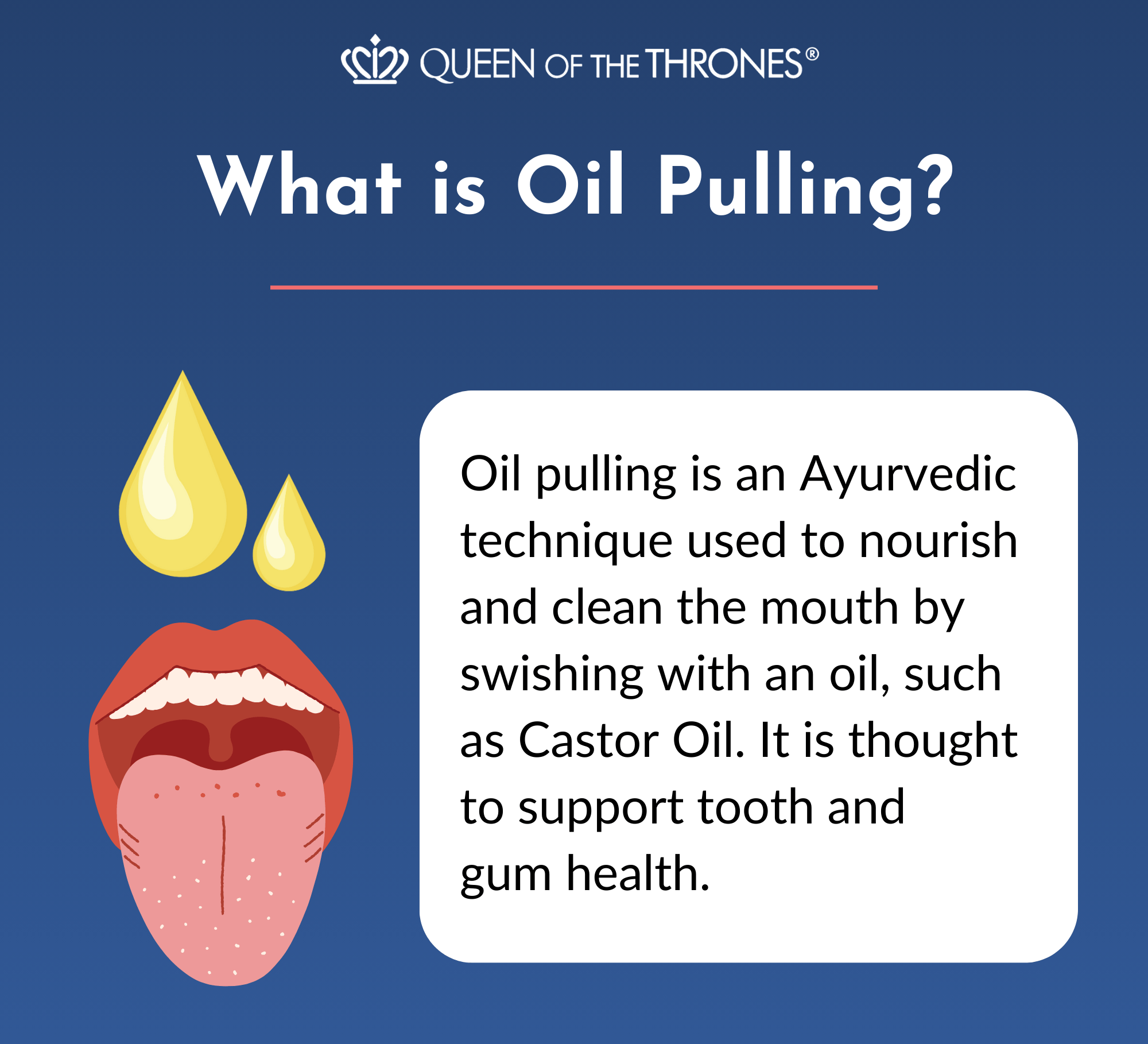
In Ayurvedic Medicine, oil pulling has been a technique used to clean the mouth. This is completely different from swishing with regular mouthwash. In fact, rinsing or oil pulling with Castor Oil has many more positive benefits.
Swishing with Castor Oil for just a couple of minutes in the morning can support gum health. Why?
Because Castor Oil is one of the few natural substances that can break through biofilm – basically a protective shell that bad bacteria creates making it very difficult to eliminate17.
One of the best parts about this, is that it’s super easy to do.
How to Oil Pull with Castor Oil
- Just measure about 2 tbsp of Castor Oil in a spoon and put it into your mouth.
- Swish it around so it coats your teeth, gums, and tongue.
- Spit it into the garbage.
*Do not swallow! Remember, Castor Oil is a laxative when taken orally! Also, you probably don’t want to spit it down your sink as oil isn’t good for drains.
Quality of Castor Oil
Glass bottles are especially important, because when it’s bottled in plastic (even BPA-free plastic), Castor Oil has the potential to absorb slip agents18, UV filters19, bisphenol, and many other impurities which can find their way into your body! You should try to avoid this because these compounds can have a negative effect on your nervous and hormonal systems.
Castor Oil Facts
Types of Castor Oil
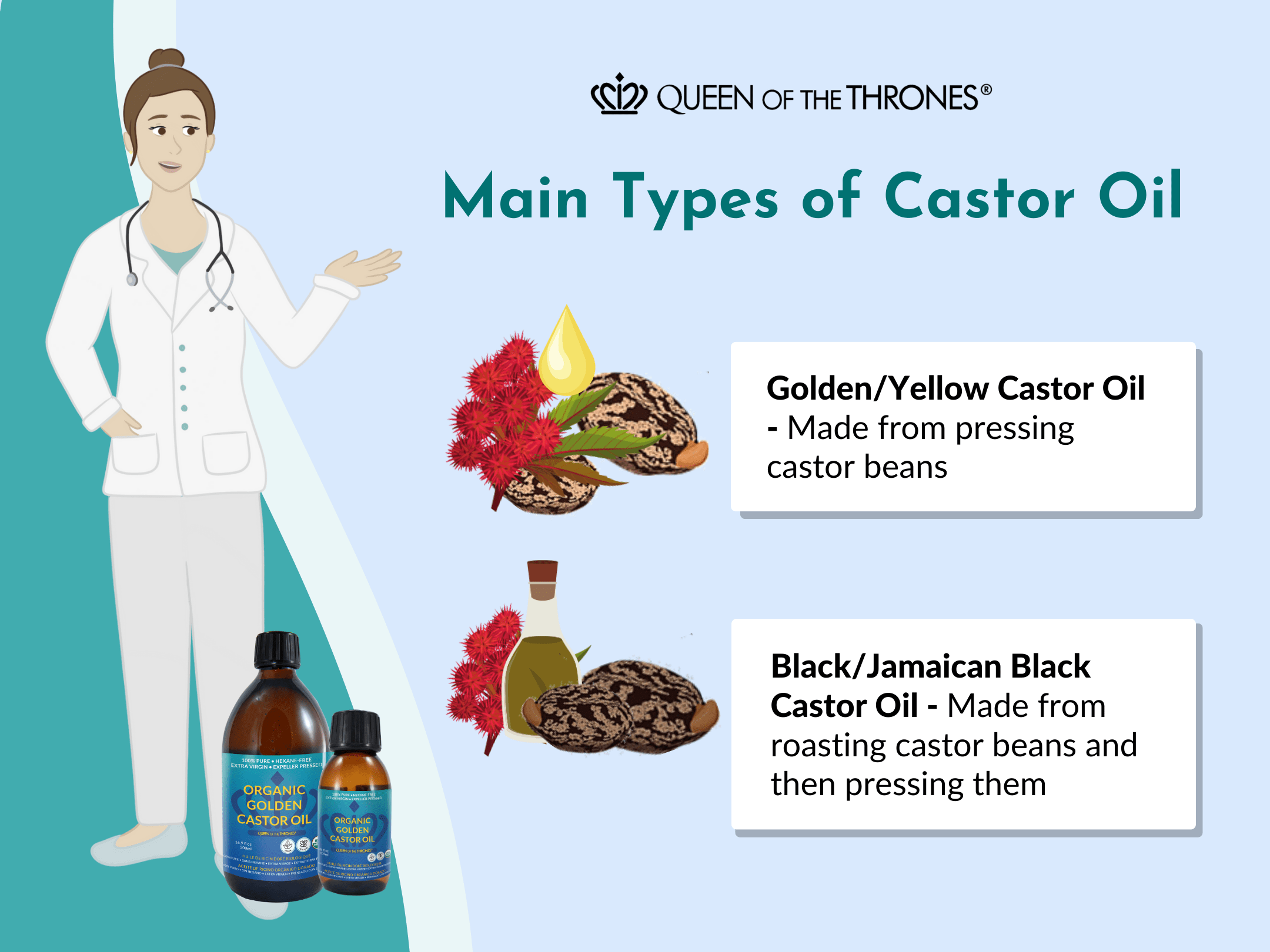
The 2 most frequently used types of Castor Oil:
- Golden/yellow – This is what comes from pure, organic, expeller or cold-pressed Castor Beans.
- Jamaican or Black Castor Oil – Made from roasting the Castor Beans and then crushing them to extract the oil
Castor Oil Nutrition
Are you a practitioner, health coach or wellness influencer? If you’re interested in recommending our easy-to-use tools and practically applying them in your health and wellness professional practice, in clinic, or online with the people you serve, you can join now!
Click here for references
- Polito L, Bortolotti M, Battelli MG, Calafato G, Bolognesi A. Ricin: An Ancient Story for a Timeless Plant Toxin. Toxins (Basel). 2019 Jun 6;11(6):324. doi: 10.3390/toxins11060324. PMID: 31174319; PMCID: PMC6628454.
- Ebers, G. Papyros Ebers: Das Hermetische Buch über die Arzneimittel der Alten Äegypter; Hinrichs, J.C., Ed.; Wilhelm Engelmann: Leipzig, Germany, 1875.
- Totelin, L.M.V. Hippocratic Recipes: Oral and Written Transmission of Pharmacological Knowledge in Fifth- and Fourth-Century Greece; Brill: Leiden, The Netherlands; Boston, MA, USA, 2009. [Google Scholar]
- Jenkins RE, Tanner JA. The structure of the major protein of the human erythrocyte membrane. Characterization of the intact protein and major fragments. Biochem J. 1977 Jan 1;161(1):139-47
- No Authors Listed. Final report on the safety assessment of Ricinus Communis (Castor) Seed Oil, Hydrogenated Castor Oil, Glyceryl Ricinoleate, Glyceryl Ricinoleate SE, Ricinoleic Acid, Potassium Ricinoleate, Sodium Ricinoleate, Zinc Ricinoleate, Cetyl Ricinoleate, Ricinoleate, Glycol Ricinoleate, Isopropyl Ricinoleate, Methyl Ricinoleate, and Octyldodecyl Ricinoleate. . Int J Toxicol. 2007;26 Suppl 3:31-77.
- Nitbani FO, Tjitda PJP, Wogo HE, Detha AIR. Preparation of Ricinoleic Acid from Castor Oil:A Review. J Oleo Sci. 2022;71(6):781-793. doi: 10.5650/jos.ess21226. PMID: 35661063.
- Van Erp H, Bates PD, Burgal J, Shockey J, Browse J Castor phospholipid:diacylglycerol acyltransferasefacilitates efficient metabolism of hydroxy fatty acids in transgenic Arabidopsis. Plant Physiol. 2011 Feb;155(2):683-93. Epub 2010 Dec 20.
- Goto E1, Shimazaki J, Monden Y, Takano Y, Yagi Y, Shimmura S, Tsubota K. Low-concentration homogenized castor oil eye drops for noninflamed obstructive meibomian gland dysfunction.Ophthalmology. 2002 Nov;109(11):2030-5.
- Bonini S1, Coassin M, Aronni S, Lambiase A. Vernal keratoconjunctivitis. Eye (Lond). 2004 Apr;18(4):345-51.
- Vieira C et al. .Effect of ricinoleic acid in acute and subchronic experimental models of inflammation. Mediators Inflamm. 2000;9(5):223-8
- Izzo AA1, Mascolo N, Capasso F. Nitric oxide as a modulator of intestinal water and electrolyte transport. Dig Dis Sci. 1998 Aug;43(8):1605-20.
- Prajna NV, Pillai MR, Manimegalai TK, Srinivasan M Use of Traditional Eye Medicines by corneal ulcer patients presenting to a hospital in South India.Indian J Ophthalmol. 1999 Mar;47(1):15-8.
- Marwat SK1, Rehman F2, Khan EA1, Baloch MS1, Sadiq M1, Ullah I1, Javaria S1, Shaheen S1. Review – Ricinus communis – Ethnomedicinal uses and pharmacological activities.Pak J Pharm Sci. 2017 Sep;30(5):1815-1827.
- Alookaran J, Tripp J. Castor Oil. 2022 Nov 21. In: StatPearls [Internet]. Treasure Island (FL): StatPearls Publishing; 2023 Jan–. PMID: 31869090.
- Arslan GG, Eşer I. An examination of the effect of castor oil packs on constipation in the elderly. Complement Ther Clin Pract. 2011 Feb;17(1):58-62. doi: 10.1016/j.ctcp.2010.04.004. Epub 2010 May 18. PMID: 21168117.
- Sorin Tunaru,a Till F. Althoff,a Rolf M. Nüsing,b Martin Diener,c and Stefan Offermannsa,d,1 Castor oil induces laxation and uterus contraction via ricinoleic acid activating prostaglandin EP3 receptors. Proc Natl Acad Sci U S A. 2012 Jun 5; 109(23): 9179–9184. Published online 2012 May 21. doi: 10.1073/pnas.1201627109 PMID: 22615395
- Andrade IM, Andrade KM, Pisani MX, Silva-Lovato CH, de Souza RF, Paranhos Hde F. Trial of an experimental castor oil solution for cleaning dentures. Braz Dent J. 2014 Jan-Feb;25(1):43-7. doi: 10.1590/0103-6440201302327. PMID: 24789291.
- Kim H1, Oh S1, Gye MC1, Shin I1,2. Comparative toxicological evaluation of nonylphenol and nonylphenol polyethoxylates using human keratinocytes. Drug Chem Toxicol. 2018 Oct;41(4):486-491. Doi: 10.1080/01480545.2017.1391829. Epub 2017 Nov 10.
- Amar SK1, Goyal S2, Srivastav AK3, Chopra D3, Ray RS2. Combined effect of Benzophenone-2 and ultraviolet radiation promote photogenotoxicity and photocytotoxicity in human keratinocytes. Regul Toxicol Pharmacol. 2018 Jun;95:298-306. Doi: 10.1016/j.yrtph.2018.04.003. Epub 2018 Apr 4.

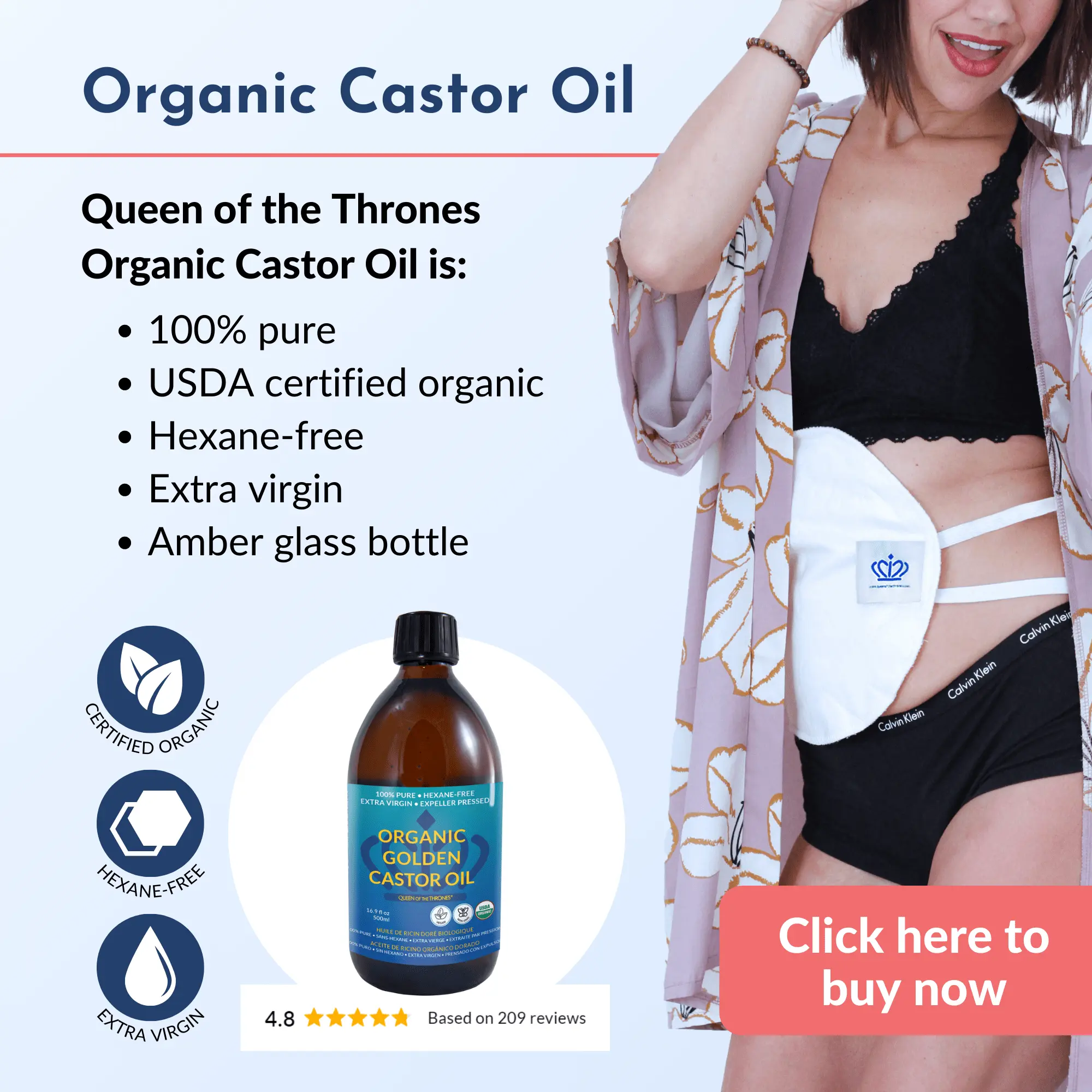


You answered every question in the book except the ones asked 😳
Where does the castor oil come from you that you use to make The Queen of Thrones Castor Oil?
Thank you for your question Freda! Our oil is currently sourced from India.
How did Queen of Thrones get its name and what does it mean?
Hey there! We always want to own our throne!
Hi,
I just read all your great information here but I am wondering if you can tell me any more about the difference between your oil and the Jamaican oil? I have been using Jamaican oil in my liver pack, is it ok to use that compared to the cold press? Are there differences in the benefits of each? Also I am wondering where your company is based, USA? Thank you!
Hey there,
The difference between Black Castor Oil and Golden Castor Oil is in the processing. Black Castor Oil, involves roasting the castor beans before pressing them to extract the oil. This process results in a darker colour of oil because of the ash produced from roasting, as well as a more alkaline pH. It is traditionally used for hair treatments and beauty.
Golden Castor Oil is 100% pure and mechanically pressed with low heat via cold-pressing or expeller-pressing, which is thought to preserve more of the nutrients in the oil. Golden Castor Oil is traditionally used in Castor Oil Packs as well as beauty practices for the skin, nails, lashes and brows.
We want to use golden oil when using the packs.
We are a Canadian based company!
There are some Castor oils that say for EXTERNAL USE ONLY… WHY IS THAT???
THANKS
SUZANNE
Castor Oil, when taken orally, is a stimulant laxative that causes cramping and makes you poop (yikes!). Queen of the Thrones® Castor Oil is for topical use only; Castor Oil Packs are a much gentler approach if you want help going to the bathroom.
Just your castor oil contain any parabens or preservatives?
It does not!
Do the packs need to be replaced with new ones regularly or can they be washed?
The goal is to not wash the pack once you have started using it, as washing may cause the oil to get all over the outer “less mess” layer of the pack, making it messier and decreasing its natural lifecycle.
Here are some great tips to extend the life of your pack:
Use 1 tbsp of fresh Castor Oil with each use
Keep the Castor Oil in the center of the pack (away from the seams)
Avoid washing your oily pack
Remember, it’s unknown whether or not substances are absorbed into your pack, so it’s important to always use fresh oil and replace your pack regularly (a good rule of thumb is to replace it every 2 months if you’re using it daily!)
Hi! Which one of your castor oils do you recommend if I am going to take it orally? I struggle with severe indigestion, gut inflammation and poor liver detoxification. I want to take it orally to try it out. Thank you!
Castor Oil, when taken orally, is a stimulant laxative that causes cramping and makes you poop (yikes!). Queen of the Thrones® Castor Oil is for topical use only; Castor Oil Packs are a much gentler approach if you want help going to the bathroom.